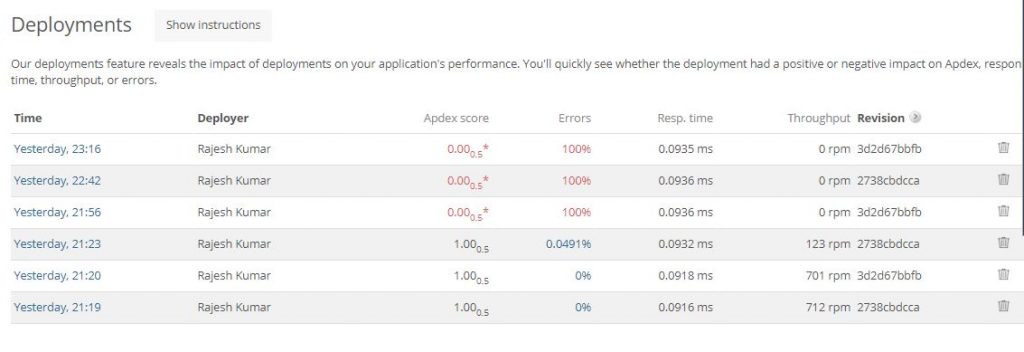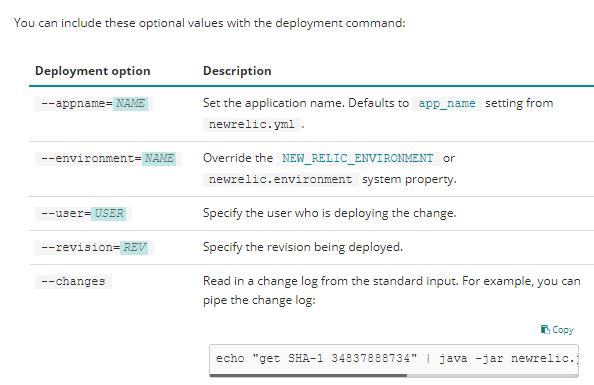The deployments resource allows for querying, creating and deleting deployment records for an application.
Deployment history
NewRelic Deployments feature reveals the impact of deployments on your application’s performance. You’ll quickly see whether the deployment had a positive or negative impact on CPU, memory, response time, throughput, database activity, or errors.

New Relic Pro customers can come here to see details of their application deployment history, including:
- Date & time
- Revision number
- Aggregate metrics for the deployed code:
- Apdex score
- CPU usage
- Memory usage
- Response time
- Throughput
- Error rate
How to track enable deployments with New Relic?
Send deployment information from the Java agent jar file?

$ java -jar newrelic.jar deployment DEPLOYMENT_OPTIONS
$ echo "get SHA-1 34837888734" | java -jar newrelic.jar deployment DEPLOYMENT_OPTIONS --changes
$ java -jar newrelic.jar deployment user=$deployed_by revision=$deployment_versioncat
$ change.log | java -jar newrelic.jar deployment --changes --revision="Summer Sale Event"Send deployment information directly via HTTPS
This API endpoint creates a deployment record for a given application. Deployment records are created with the following attributes:
Required:
- Application ID
- Revision, such as a git SHA
Optional:
- Changelog
- Description
- User posting the deployment
- Timestamp of the deployment
curl -X POST 'https://api.newrelic.com/v2/applications/{application_id}/deployments.json' \
-H 'X-Api-Key:{api_key}' -i \
-H 'Content-Type: application/json' \
-d \
'{
"deployment": {
"revision": "string",
"changelog": "string",
"description": "string",
"user": "string"
}
}'
#!/bin/sh
# Variables
WAR_FILE_V1="petclinic-1.0.war"
WAR_FILE_V2="petclinic-2.0.war"
HOST_NAME="13.234.21.228"
PORT="80"
AWS_KEY_FILE="./rajesh-mumbai.pem"
AWS_EC2_INSTANCE="ubuntu@${HOST_NAME}"
APP_URL="http://${HOST_NAME}:${PORT}/petclinic/"
NR_API_KEY="NRRA-8be5d1f42ee92bcaccdce4675b6cdcc5842f0d0c3e"
NR_APP_ID="294580546"
NR_DEPLOY_CHANGELOG_V1="Initial deploy"
NR_DEPLOY_CHANGELOG_V2="Replaced dandelion datatables with jQuery, removed session state caching"
NR_DEPLOY_DESC_V1="v1.0"
NR_DEPLOY_DESC_V2="Upgrade to v2.0"
NR_DEPLOY_REVISION_V1="2738cbdcca"
NR_DEPLOY_REVISION_V2="3d2d67bbfb"
NR_DEPLOY_USER="Rajesh Kumar"
JMETER_SCRIPT="aws.jmx"
deployApp ()
{
# Copy WAR file to webapps folder
echo "\n--- Deploying" $1 "\n"
scp -i $AWS_KEY_FILE ./$1 $AWS_EC2_INSTANCE:~/webapps/petclinic.war
# Set deployment marker
deploymentMarker "$2" "$3" "$4"
# Restart Docker container
echo "\n--- Restarting petclinic container"
ssh -i $AWS_KEY_FILE $AWS_EC2_INSTANCE 'sudo docker restart petclinic'
# Wait for app restart
echo "\n--- Waiting for app restart"
sleep 30
while [ $(curl -s -o /dev/null -I -w "%{http_code}" $APP_URL) -ne 200 ] ; do
printf "."
done
echo
return
}
deploymentMarker ()
{
echo "\n--- Setting deployment marker\n"
curl -X POST "https://api.newrelic.com/v2/applications/${NR_APP_ID}/deployments.json" \
-H "X-Api-Key:${NR_API_KEY}" -i \
-H 'Content-Type: application/json' \
-d \
"{
\"deployment\": {
\"revision\": \"${2}\",
\"changelog\": \"${3}\",
\"description\": \"${1}\",
\"user\": \"${NR_DEPLOY_USER}\"
}
}"
return
}
startJmeter ()
{
# Start JMeter script
/c/tools/apache-jmeter-5.3/bin/jmeter -n -JHOST=${HOST_NAME} -JPORT=${PORT} -t $1
return
}
deployApp "$WAR_FILE_V1" "$NR_DEPLOY_DESC_V1" "$NR_DEPLOY_REVISION_V1" "$NR_DEPLOY_CHANGELOG_V1"
echo "\n--- Starting Jmeter. Wait 10-15 minutes, then run thread profiler\n"
startJmeter "$JMETER_SCRIPT"
# After 10-15 minutes, start thread profiler
# When Jmeter script completes, deploy v2 and repeat
deployApp "$WAR_FILE_V2" "$NR_DEPLOY_DESC_V2" "$NR_DEPLOY_REVISION_V2" "$NR_DEPLOY_CHANGELOG_V2"
echo "\n--- Starting Jmeter. \n"
startJmeter "$JMETER_SCRIPT"Reference
https://rpm.newrelic.com/api/explore/application_deployments/create
I’m a DevOps/SRE/DevSecOps/Cloud Expert passionate about sharing knowledge and experiences. I am working at Cotocus. I blog tech insights at DevOps School, travel stories at Holiday Landmark, stock market tips at Stocks Mantra, health and fitness guidance at My Medic Plus, product reviews at I reviewed , and SEO strategies at Wizbrand.
Please find my social handles as below;
Rajesh Kumar Personal Website
Rajesh Kumar at YOUTUBE
Rajesh Kumar at INSTAGRAM
Rajesh Kumar at X
Rajesh Kumar at FACEBOOK
Rajesh Kumar at LINKEDIN
Rajesh Kumar at PINTEREST
Rajesh Kumar at QUORA
Rajesh Kumar at WIZBRAND

 Starting: 1st of Every Month
Starting: 1st of Every Month  +91 8409492687
+91 8409492687  Contact@DevOpsSchool.com
Contact@DevOpsSchool.com
 by
by 